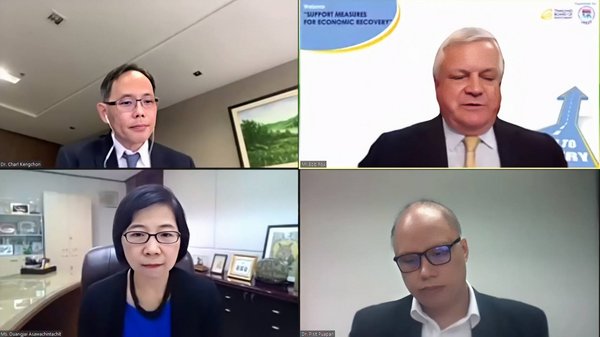BANGKOK, Aug. 6, 2020 /PRNewswire/ — The Thailand Board of Investment (BOI) is urging investors to focus on enhancing productivity and efficiency through automation and human resource training by taking advantage of the key promotion measures offered to them, in order to prepare for the economic recovery expected in 2021, BOI’s secretary general said on Wednesday.

The Board of Investment (BOI) and the Joint Foreign Chambers of Commerce in Thailand (JFCCT) hosted a webinar entitled “Support Measures for Economic Recovery” during which Ms. Duangjai Asawachintachit, BOI Secretary General, Dr. Pisit Puapan, Executive Director, Macroeconomic Policy Bureau, Ministry of Finance, Dr. Charl Kengchon, Executive Chairman, Kasikorn Research Center, and Mr. Bob Fox, from the JFCCT, discussed the measures taken to help businesses get back on the road to recovery.
“We are now focusing not only on attracting new investment projects but given the economic situation we also believe it is necessary to make existing ones more productive, to have a higher level of productivity which is a critical issue for Thailand to move forward,” Ms Duangjai Asawachintachit, Secretary General of the BOI, told a Webinar titled “Support Measures for Economic Recovery” that was co-hosted by the Joint Foreign Chamber of Commerce in Thailand (JFCCT).
For 2020, Thailand’s Finance Ministry anticipates a 8.1% contraction of the GDP, with a progressive improvement from the third quarter which should lead to a rebound in 2021.
“Looking forward I think we can expect the economy to gradually pick up in the remaining half of this year,” said Pisit Puapan, Director of the Macroeconomic Policy Bureau of the Thai Finance Ministry. “For 2021 the Ministry of Finance expects the Thai economy to rebound and show a positive growth rate of 4-5%,” Pisit said.
Since the outbreak of COVID-19 earlier this year, the BOI has been quick to introduce measures to facilitate existing operations, including by relaxing deadlines and offering incentives for productivity enhancement, as well as measures to attract new foreign direct investment (FDI) in sectors showing strong potential in the post-COVID world. These steps include additional tax incentives, as well as non-tax incentives, provided by the BOI to sectors that have now become more important under the health crisis, such as projects in medical equipment and food security.
“I think the COVID-19 crisis has reiterated the necessity for us to move forward to more automation and robotics, so we are encouraging companies to invest in automation to become more efficient or have better products at lower costs,” Ms Duangjai said. “So we are now offering tax incentives for companies that would like to invest in new machinery, to replace existing ones, for the purpose of energy conservation or to use lower energy or to reduce the impact on the environment.”
Another key area for promotion is in training and development of human resources, again with an emphasis on both new and existing projects.
“We are encouraging by incentivizing companies to spend more on training,” Duangjai said. “So if companies spend on manpower development then they can have a higher corporate income tax exemption.”
Thailand has faced a surge in furlough as a result of the lockdowns in April-May in response to the COVID pandemic, and the threat of burgeoning unemployment in the coming months or years is real, although the worst of the economic impact was no doubt felt in the second quarter of 2020.
But even with a uptick in GDP growth in 2021, Thailand’s economy – with its heavy dependence on exports and international tourism – should prepare itself for a “new normal” post-COVID, warned Charl Kengchon, Executive Chairman of the Kasikorn Research Center, who was also representing the Thai Bankers Association at the Webinar.
“We think that Thailand will find herself in a totally new environment. Deglobalization has already taken place,” Charl said. “Pandemic and fear of pandemic after COVID is not going to help global trade because increasingly more and more government will come to the realization that public health in fact is a kind of national security issue and they are going to implement safeguards on health care and there are going to be non-tariff barriers because of that,” he said.
One obvious challenge to attracting FDI in the time of COVID has been the difficulty potential investors face in just entering the country, and being forced to remain in quarantine for 14 days if they manage to.
Ms Duangjai said the BOI is currently working with other Thai government agencies and a selected number of countries to find solutions to allow the resumption of business travel to Thailand.
Photo – https://photos.prnasia.com/prnh/20200806/2878576-1?lang=0



